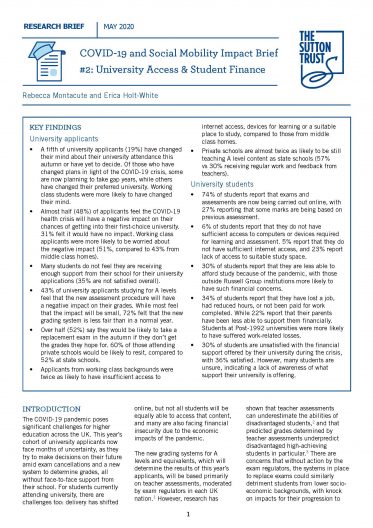Assessment and Admissions
1. Exam regulators, including Ofqual, should monitor attainment gaps in the new grading system and consider statistical adjustments if necessary. If substantial socio-economic attainment gaps open up during the adjustment process, Ofqual should be prepared to make further adjustments.
2. Applicants from disadvantaged backgrounds who have narrowly missed their offer grades should be given additional consideration. Contextualising admissions in this year’s application cycle is more important than ever, given the recent upheaval in schools and the cancellation of exams.
3. In the future, university admissions should move to Post-Qualification Applications. The unreliability of predicted grades has been acknowledged in Ofqual’s role in adjusting grades. We should take this opportunity to remove predicted grades from the system entirely by moving to a post-qualification system going forward.
4. If student number caps are to be introduced, they should be carefully calibrated to minimise their impact on disadvantaged students and the widening participation agenda. Any temporary re-introduction of number caps should not undermine the efforts of selective universities in particular to meet their Access and Participation Plan targets.
5. Approaching the final UCAS deadline, and around A Level results day, it is vital that schools are able to offer additional support and advice to students making decisions around their future. This is particularly the case for those who are the first in their family to attend university, or those from disadvantaged backgrounds more generally. This could be done remotely if necessary.
Students
1. Additional financial support for students is vital both to ensure current students can continue their courses, and access is not harmed for current university applicants from families suffering from financial stresses due to coronavirus. Universities should bolster hardship funds where possible, including increasing awareness of such funds. But government should also consider stepping in to offer emergency maintenance grants.
2. Universities should ensure that students, particularly those in final year, are not disadvantaged due to changes in assessment required by the lockdown. This is particularly the case for students from disadvantaged backgrounds, who are less likely to have access to the equipment, internet access and workspaces required to complete assessments online. Universities should offer all reasonable accommodations to such students.
